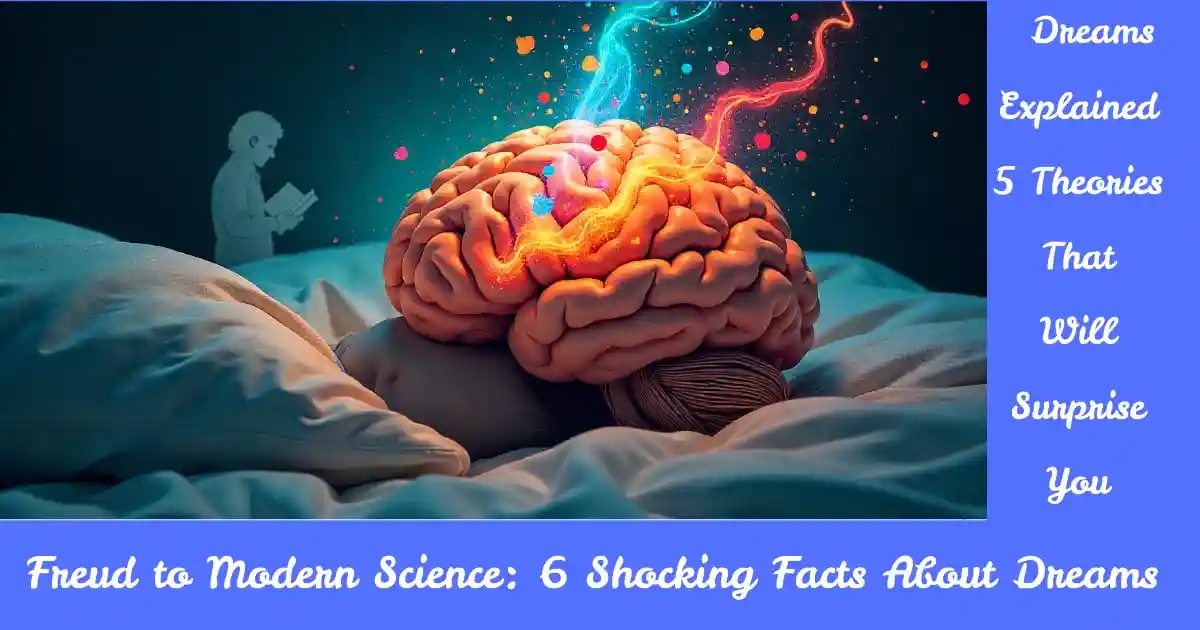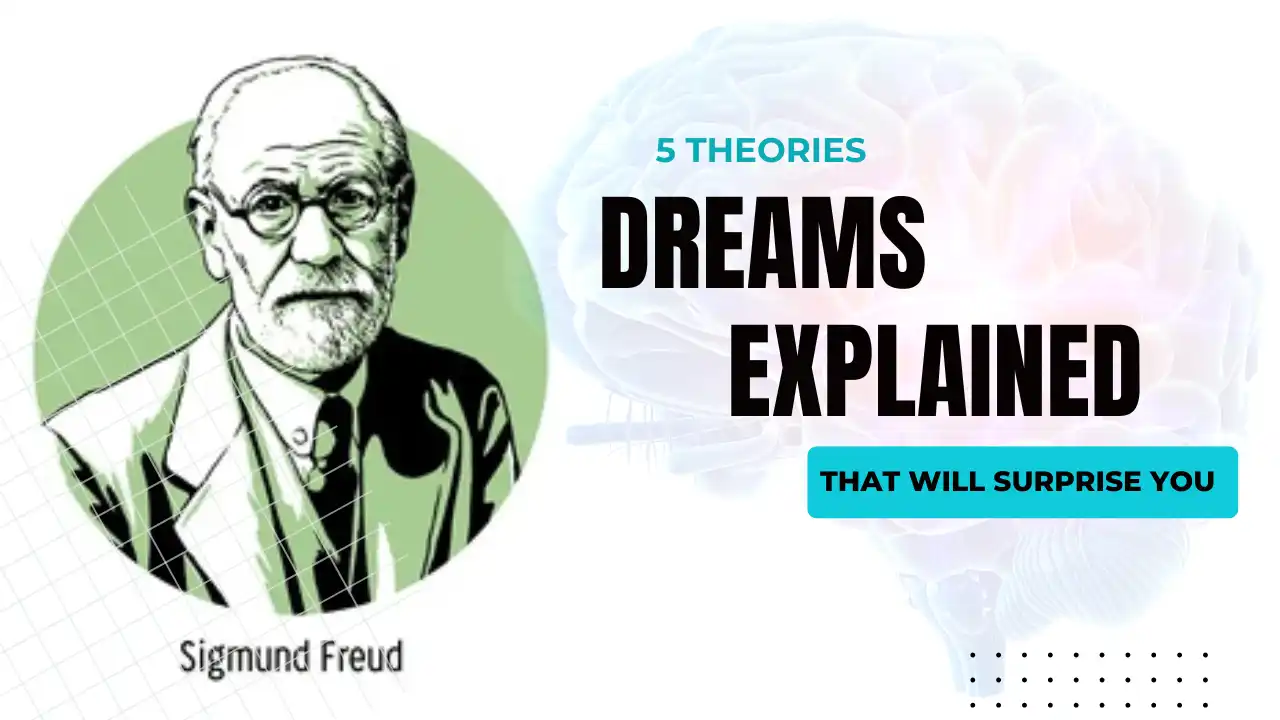Dreams in human life are a mysterious experience. Sometimes joyful, sometimes frightening, and sometimes completely vague. Dreams reflect the ongoing thoughts, feelings, and emotions within our subconscious mind. Since ancient times, philosophers have discussed dreams, but scientific research on them began much later.

Sigmund Freud explained dreams as reflections of repressed desires, while modern scientists have linked them to mental health, creativity, and brain function. Let us now explore various theories and scientific explanations related to dreams.
Sigmund Freud | Biography, Theories, Psychology, Books …
Important Words/Phrases from the Passage on Dreams:
| Word/Phrase | Bangla Meaning |
| Dream | স্বপ্ন |
| Empirical research | পরীক্ষালব্ধ গবেষণা |
| Philosopher | দার্শনিক |
| Scientific study | বৈজ্ঞানিক গবেষণা |
| Puzzling | বিভ্রান্তিকর / ধাঁধার মতো |
| Content of a dream | স্বপ্নের বিষয়বস্তু |
| Vivid | জীবন্ত / স্পষ্ট |
| Vague | অস্পষ্ট |
| Joyful emotions | আনন্দময় আবেগ |
| Frightening images | ভীতিকর ছবি |
| Unclear and confusing | অস্পষ্ট ও বিভ্রান্তিকর |
| Consensus | সর্বসম্মত মতামত |
| Baffling | বিভ্রান্তিকর / অবাক করা |
| Unraveling | উদঘাটন করা |
| Mental well-being | মানসিক সুস্থতা |
| Emotional well-being | আবেগীয় সুস্থতা |
| Physical well-being | শারীরিক সুস্থতা |
| Psychoanalytic perspective | মনোবিশ্লেষণমূলক দৃষ্টিভঙ্গি |
| Subconscious desires | অবচেতন ইচ্ছা |
| Motivations | প্রেরণা |
| Aggressive instincts | আক্রমণাত্মক প্রবৃত্তি |
| Sexual instincts | যৌন প্রবৃত্তি |
| Repressed wishes | দমিত আকাঙ্ক্ষা |
| Awareness | সচেতনতা / উপলব্ধি |
| Disguised fulfillments | ছদ্মবেশী পূর্ণতা |
| Interpretation | ব্যাখ্যা / বিশ্লেষণ |
| Subjective interpretation | ব্যক্তিনির্ভর ব্যাখ্যা |
| Cognitive elements | জ্ঞানগত উপাদান |
| External stimuli | বাহ্যিক উদ্দীপক |
| Metaphor | রূপক |
| Clutter | অপ্রয়োজনীয় জটলা / বিশৃঙ্খলা |
| Refreshing the mind | মস্তিষ্ককে সতেজ করা |
| Psychotherapy | মনোরোগ-চিকিৎসা |
| Safe environment | নিরাপদ পরিবেশ |
| Connections | সংযোগ / সম্পর্ক |
| Signals generated by the brain | মস্তিষ্কে উৎপন্ন সংকেত |

Coal Mining: The Brutal Truth of Human Struggle – U5L4
স্বপ্ন কী? (What is a Dream?)
Dreams have fascinated philosophers for thousands of years, but only recently have dreams been subjected to empirical research and scientific study. Chances are that you’ve often found yourself puzzling over the content of a dream, or perhaps you’ve wondered why you dream at all.
First, let’s start by answering a basic question: What is a dream? A dream can include any of the images, thoughts, and emotions that are experienced during sleep. Dreams can be extraordinarily vivid or very vague: filled with joyful emotions or frightening images; focused and understandable or unclear and confusing.
আমরা কেন স্বপ্ন দেখি? (Why Do We Dream?)
Why do we dream? What purpose do dreams serve? While many theories have been proposed about the reason and function of dreams, no consensus has emerged. Considering the time we spend in a dreaming state, the fact that researchers do not yet understand the purpose of dreams may seem baffling. However, it is important to consider that science is still unraveling the exact purpose and function of sleep itself. Some researchers suggest that dreams serve no real purpose, while others believe that dreaming is essential to mental, emotional and physical well-being.
Next, let’s learn more about some of the most prominent dreary theories.
Freud এর Psychoanalytic Theory of Dreams:
Consistent with the psychoanalytic perspective. Sigmund Freud’s theory of dreams suggests that dreams are a representation of subconscious desires, thoughts and motivations. According to Freud, people are driven by aggressive and sexual instincts that are repressed from conscious awareness. While these thoughts are not consciously expressed, they find their way into our awareness via dreams. In his famous book The Interpretation of Dreams (1899), Freud wrote that dreams are disguised fulfillments of repressed wishes.”
স্বপ্ন সম্পর্কিত অন্যান্য তত্ত্ব (Other Theories of Dreams)
Freud’s theory contributed to the popularity of dream interpretation. Following his paths, many theorists came up with their own ideas about dreams. The following are just a few of them:
Cognitive Theory – মস্তিষ্কের সংকেতের ব্যক্তিগত ব্যাখ্যা
Some researchers suggest that dreams are a subjective interpretation of signals generated by the brain during sleep. Dreams are not meaningless. Instead, during dreams, the cognitive elements in our brain produce new ideas.
External Stimuli Theory – বাহ্যিক শব্দের প্রভাব
One theory suggests that dreams are the result of our brains trying to interpret external stimuli during sleep. For example, the sound of the radio may be incorporated into the content of a dream.
Computer Metaphor Theory – মস্তিষ্কের “ক্লিন-আপ” প্রক্রিয়া
Another theory uses a computer metaphor to account for dreams. According to this theory, dreams serve to ‘clean up’ clutter from the mind, much like clean-up operations in a computer, refreshing the mind to prepare for the next day.
Psychotherapy Model – নিরাপদ পরিবেশে চিন্তা ও আবেগের সংযোগ Yet another model proposes that dreams function as a form of psychotherapy. In this theory, the dreamer is able to make connections between different thoughts and emotions in a safe environment.
[This passage/content is taken from the National Curriculum and Textbook Board (NCTB), Bangladesh English textbook for educational purposes only.]
© NCTB Bangladesh. All rights reserved to the original publisher.

Master 5 Sentence Transformation: Assertive to Exclamatory
Paragraph-wise Bangla Explanation:
Paragraph 1
হাজার বছরেরও বেশি সময় ধরে দার্শনিকরা স্বপ্ন নিয়ে ভাবছেন। তবে সাম্প্রতিক কালে বৈজ্ঞানিক গবেষণা শুরু হয়েছে। আমরা প্রায়ই স্বপ্ন দেখে তার অর্থ বুঝতে চাই বা কেন স্বপ্ন দেখি সে নিয়ে প্রশ্ন করি।
Paragraph 2
স্বপ্ন বলতে ঘুমের মধ্যে যে ছবি, চিন্তা ও আবেগ অনুভূত হয় তাই বোঝায়। এগুলো কখনো খুব পরিষ্কার আবার কখনো অস্পষ্ট হতে পারে, কখনো আনন্দদায়ক আবার কখনো ভয়ঙ্করও হতে পারে।
Paragraph 3
স্বপ্নের উদ্দেশ্য কী, তা নিয়ে বহু তত্ত্ব আছে। কেউ বলেন স্বপ্নের কোনো উদ্দেশ্য নেই, আবার কেউ বলেন মানসিক, আবেগীয় ও শারীরিক সুস্থতার জন্য স্বপ্ন অপরিহার্য। ঘুম ও স্বপ্নের উদ্দেশ্য বিজ্ঞানীরা এখনো পুরোপুরি উন্মোচন করতে পারেননি।
Paragraph 4 (Freud)
Sigmund Freud-এর মতে, স্বপ্ন আসলে আমাদের অবচেতন মনের ইচ্ছা, চিন্তা ও আকাঙ্ক্ষার প্রতিফলন। মানুষ প্রায়ই যৌন ও আক্রমণাত্মক প্রবৃত্তি দমন করে রাখে, আর সেগুলোই স্বপ্নে প্রকাশ পায়। তাঁর বিখ্যাত বই The Interpretation of Dreams (1899) এ তিনি লিখেছেন, স্বপ্ন আসলে দমিত ইচ্ছার প্রতিফলন।
Paragraph 5 (Other theories): অন্যান্য গবেষকরা বলেন —
- স্বপ্ন আসলে ঘুমের সময় মস্তিষ্কে উৎপন্ন সংকেতের ব্যক্তিগত ব্যাখ্যা।
- বাহ্যিক শব্দ বা উদ্দীপক (যেমন—রেডিওর আওয়াজ) স্বপ্নে ঢুকে যেতে পারে।
- কেউ কেউ স্বপ্নকে কম্পিউটারের মতো “ক্লিন-আপ” প্রক্রিয়ার সঙ্গে তুলনা করেন, যা পরের দিনের জন্য মস্তিষ্ককে প্রস্তুত করে।
- আবার একদল মনে করেন, স্বপ্ন এক ধরণের “সাইকোথেরাপি” যেখানে স্বপ্নদ্রষ্টা নিরাপদ পরিবেশে চিন্তা ও আবেগকে সংযুক্ত করতে পারেন।
Relevant Historical Event:
১৯০০ সালে Sigmund Freud-এর The Interpretation of Dreams প্রকাশের মাধ্যমে আধুনিক মনোবিজ্ঞানে স্বপ্ন গবেষণার সূচনা হয়। Freud-কে “স্বপ্ন বিশ্লেষণের জনক” বলা হয়। তাঁর পরবর্তী গবেষণাই মনোবিশ্লেষণকে শক্ত ভিত্তি দেয় এবং বিশ্বব্যাপী স্বপ্নের উপর নতুন দৃষ্টিভঙ্গি তৈরি করে।
Literary Terms:
- Metaphor (রূপক): কম্পিউটার ক্লিন-আপের সঙ্গে স্বপ্নের তুলনা করা হয়েছে।
- Imagery (চিত্রকল্প): স্বপ্নকে উজ্জ্বল ছবি, আনন্দ, ভয় ইত্যাদির মাধ্যমে বর্ণনা করা হয়েছে।
- Symbolism (প্রতীক): Freud স্বপ্নকে দমিত ইচ্ছার প্রতীক হিসেবে ব্যাখ্যা করেছেন।
Short Questions (2×5=10):
- What is a dream?
- Why do scientists still find dreams baffling?
- Mention two emotions that may appear in dreams.
- What does the psychoanalytic perspective say about dreams?
- How can external stimuli enter into our dreams?

